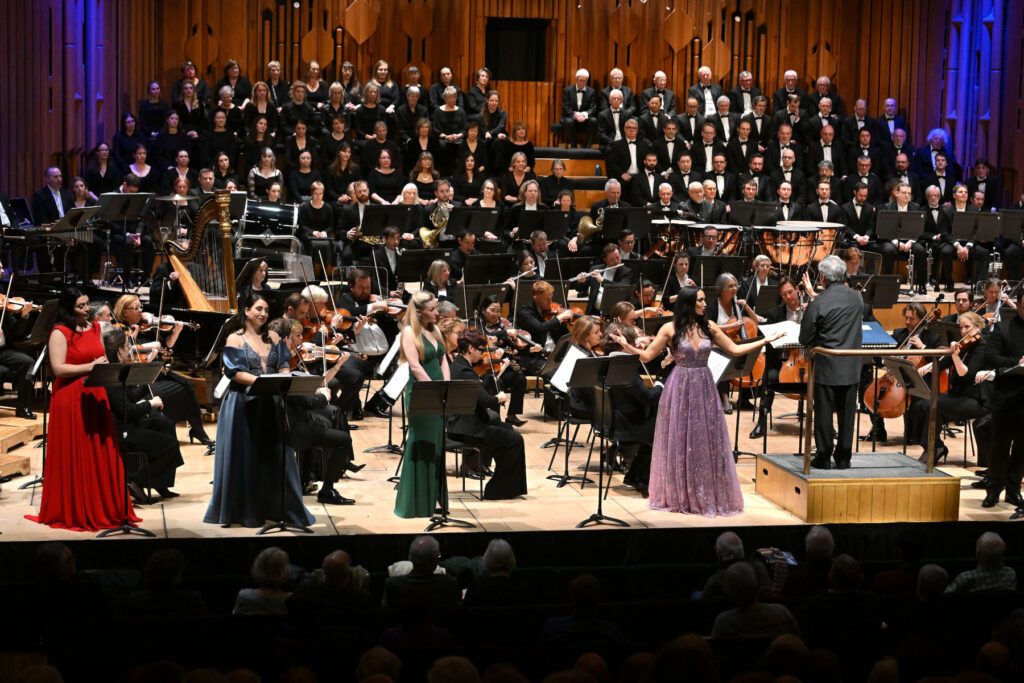“A wonderful fact to reflect upon, that every human creature is constituted to be that profound secret and mystery to every other.” This opening line from chapter three of Charles Dickens’ A Tale of Two Cities loosely points to the core of Puccini’s bitter-sweet romance that is La rondine. Its central protagonist, Magda, isa high-society mistress who returns to Paris for her wealthy and elderly lover Rambaldo after eloping to Nice with the young Ruggero to find true love and attempt to bury the secrets of her past from a disapproving family.
In Tuesday night’s Barbican performance Antonio Pappano made no secret of his love for La rondine, coaxing stylish playing from the London Symphony Orchestra, and bringing clarity to its sumptuous orchestral textures and refinement to its dizzying waltzes. Who would have thought a work still sometimes regarded as a “poor man’s Traviata” could sound so ravishing, especially when a conductor as classy as Pappano outlines the score’s colourful detail with such demonstrable affection. And those bold, experimental harmonies never felt out of place, with everything from the podium perfectly judged and the voices only occasionally having to strain over the orchestra.
Premiered in 1917, La rondine was written as a commission for an operetta, a request that Puccini partially fulfilled (there’s no spoken dialogue), but intended to challenge Franz Lehár’s domination of the genre. The work, however, has never gripped the public imagination and only as recently as 2002 did it secure a full staging at Covent Garden. Unlike the composer’s other mature operas, there’s little real drama, no heart-rending tragedy; nobody impales themselves on a knife or leaps off a castle wall. But neither does La rondine end entirely happily despite its reconciliation between Magda and her dull amour Rambaldo. Yet the work is rich in melody, if mostly remembered for its hit number in Act 1. For some, frustration lies in the problem of unfulfilled expectations, a sense of being shortchanged with an ending that can feel either too neat or just disappointingly incomplete. Whatever one’s misgivings about the work’s perceived failures, this concert hall presentation, with soloists strung out at the front of the stage, brought several outstanding performances.

This was no sterile presentation and brought some lively characterisation, most impressively from the Bolivian-Albanian soprano Carolina López Moreno as Magda, standing in for an indisposed Nadine Sierra. That she knew the score intimately was readily apparent – she had sung the work in Turin last year – and gave a compelling performance. Early on she made clear her operatic credentials in “Chi il bel sogno di Doretta” – Doretta’s Beautiful Dream – a tune memorably recycled in the 1985 Merchant Ivory film A Room with a View. Thereafter, she endowed her character with all the necessary rapture and pathos, combining powerful expression with a wonderfully floated upper register. Michael Fabiano as an ardent Ruggero made heavy weather of his opening number, “È la città dei desideria”, a fact not helped by his reliance on the printed score. And while chemistry between him and López Moreno was always a one-sided affair, Fabiano grew in stature and found his form in the impassioned Act 3 duet “Ma come puoi lasciarmi” (But how can you leave me).
A mahogany-toned Ashley Riches was convincing as the stuffed shirt Rambaldo, his po-faced demeanour nicely contrasting with Paul Appleby’s endearing Prunier whose tenor glowed pleasingly in “Forse come la rondine”, his aria predicting Magda’s destiny will bring laughter and tears. Her maid, the moody and stage-struck Lisette, was given a sultry performance by Serena Gamberoni, eyes flashing provocatively and adding much passion to the Act 2 set piece “Bevo al tuo fresco sorriso” (I drink to your fresh smile). Behind the orchestra, a well-prepared LSO chorus made the most of its champagne quaffing role for Bullier’s night club. Elsewhere, Sarah Dufresne, Angela Schisano and Marvic Monreal impressed in their cameo roles.
In summary, this glittering performance should make naysayers reassess this lavish score, a re-evaluation not before time in the composer’s centenary year. The work may not be Puccini’s best kept secret, but it comes pretty close. Another UK staging can’t come round soon enough.
David Truslove
La rondine
Music: Giacomo Puccini
Libretto: Guiseppi Adami, adapted from a German text by A.M. Willner and H. Riechert
Cast:
Magda – Carolina López Moreno; Rambaldo – Ashley Riches; Ruggero – Michael Fabiano; Prunier – Paul Appleby; Lisette – Serena Gamberoni; Yvette/ Giorgette – Sarah Dufresne; Bianca/Gabriele – Angela Schisano; Suzy/Lolette – Marvic Monreal; Crebillo –Hector Bloggs; Perichaud – Tom McGowan; Son Gobin – Sang Eup; London Symphony Orchestra; London Symphony Chorus; Conductor – Sir Antonio Pappano
Barbican, London, 10 December 2024
Photos © Mark Allan Photography